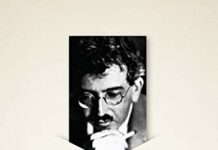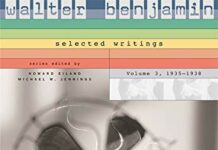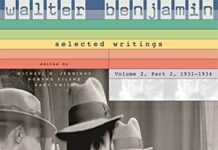
Ebook Info
- Published: 2080
- Number of pages: 348 pages
- Format: PDF
- File Size: 7.67 MB
- Authors: Walter Benjamin
Description
A companion volume to Illuminations, the first collection of Walter Benjamin’s writings, Reflections presents a further sampling of his wide-ranging work. Here Benjamin evolves a theory of language as the medium of all creation, discusses theater and surrealism, reminisces about Berlin in the 1920s, recalls conversations with Bertolt Brecht, and provides travelogues of various cities, including Moscow under Stalin. He moves seamlessly from literary criticism to autobiography to philosophical-theological speculations, cementing his reputation as one of the greatest and most versatile writers of the twentieth century. Also included is a new preface by Leon Wieseltier that explores Benjamin’s continued relevance for our times.
User’s Reviews
Editorial Reviews: From Publishers Weekly An extraordinary collection of writings of a major modern thinker and cultural critic, this is a companion volume to Illuminations, edited by Hannah Arendt. Here Benjamin evolves a theory of language as the medium of all creation, discusses theater and surrealism, recounts Berlin in the ’20s, recalls conversations with Brecht, provides travelogues of various cities, including Moscow under Stalin. PW called this “haunting, brilliant, modern.” Copyright 1986 Reed Business Information, Inc. Review “There has been no more original, no more serious critic and reader in our time.”–George Steiner”Benjamin is a legitimate ancestor of much that for the moment is most alive in criticism.”–The Nation”This book is just that: reflections of a highly polished mind that uncannily approximate the century’s fragments of shattered traditions.” – Time From the Inside Flap A companion volume to Illuminations (also available in Schocken paperback), Reflections presents a new sampling of Walter Benjamin’s wide-ranging work. In addition to literary criticism, it contains autobiographical narration and travel pieces, aphorisms, and philosophical-theological speculations. From the Back Cover “There has been no more original, no more serious critic and reader in our time.”–George Steiner”Benjamin is a legitimate ancestor of much that for the moment is most alive in criticism.”–The Nation”This book is just that: reflections of a highly polished mind that uncannily approximate the century’s fragments of shattered traditions.” – Time About the Author Walter Benjamin is recognized as one of the most acute analysts of literary and sociological phenomenon of the nineteenth and twentieth centuries. He died in 1940. Read more
Reviews from Amazon users which were colected at the time this book was published on the website:
⭐Meet my friend WalterA bit in the manner of Conrad, Benjamin invites the reader to join him for a chat, and then proceeds to spin a complicit web of observations and images difficult to put down.Ideal companion for a voyage or a quiet afternoon, short sketches grow and grow, perceptive European cityscapes from the 30’s (Naples, Marseille, Moskow) amuse and inform, while thoughtful reflextions return to the reader many days later. Bon voyage
⭐This was is a beautiful introduction to critical theory, by a writer who’s worldview was shaped by the horrors of the Holocaust. Never stops being relevant.
⭐Lincoln said it first: if this is the kind of thing you like, this is the thing you will like. I’m a writer who admires the great critical essayists/philosspher theorists. Benjamin is universally acknowledged to be among the very best.
⭐Very dense writing. A great intellect, but you have to hang in there. It’s easier when Benjamin is writing about cities, or personal experiences.
⭐Kraus and Critique of Violence are essential.
⭐Benjamin is an extremely powerful writer. I bought this book specifically for Zur Kritik Der Gewalt, but I’ve enjoyed other essays.
⭐As signs that what was really desired a hundred years ago like the promise of a new age could be put into words as the lack of what users of the internet now get for stump, stomp, snort, and chortle, is an attempt to picture the crisis of the arts then. Walter Benjamin quotes the following words from Apollinaire’s L’esprit nouveau et les poetes (1918);For the speed and simplicitywith which we have all becomeused to referring by a single wordto such complex entities as a crowd,a nation, the universe, there is nomodern equivalent in literature. But today’swriters fill this gap; their synthetic workscreate new realities the plastic manifestationsof which are just as complex as those referredto by the words standing for collectives. (p. 184).The conquests of science rest far more ona surrealistic than on a logical thinking. (p. 185).
⭐In Reflections, editor Peter Demetz has taken eighteen essays by Walter Benjamin written over roughly a decade and has grouped them into four categories. Each category captures an essence of Benjamin’s life that he found over-riding at that time. Benjamin’s life was a whirlpool of essences that was startlingly far-reaching: the lessening of human values in post-war Europe, the ineffable quality of a work’s “aura,” the immediacy of memory as a means and mode of consciousness, the interlocking of barbarism and civilization in an eternal spatial and temporal bear hug, the role of Jewish Messianism, the paradoxical discrepancy between the size of a small object and its capacity to encompass the purity of a much larger essence, the greater importance of visual/tactile phenomena over their Platonic abstractions, the observant seemingly idle flâneur who strolls effortlessly amidst crowded Parisian streets, and his obsession with slowing down the pacing of a pulsating urban scene so as to capture its inner essence in the stasis of a pseudo-photograph.These essays reveal a Benjamin who liked to travel all over Europe. In Section One, he strolls through Berlin in A Berlin Chronicle and assorted areas of interest throughout Germany in One-Way Street. Benjamin’s sharp eye for detail reveals how past experiences manifest themselves in memories that are less temporal in nature but more associational in sweep. For him, the act of recalling past details is akin to Wordsworth’s images recalled in tranquility though editor Demetz sees a Proustian unraveling of a onion memory at work too. His memory images are charged with a palpable sense of “thing-ness” that over-ride their concomitant abstraction. Further these memories are not simply recalled for their visceral connotation; rather they serve as tenuous links that connect an early version of a callow Benjamin to a more aware more mature version.In the second section, Benjamin is the flâneur who begins to internalize an incipient Marxist bent as he travels about Europe. He visits Moscow, hoping to see firsthand evidence that Lenin’s proletarian revolution had truly brought about the workers’ paradise sought after by so many like Benjamin. He is disappointed in the grubbiness and poverty-stricken slums that were Moscow but still remains enchanted by the dream that Communism is the key, perhaps belated, to reaching the full economic potential of mankind. Marseilles in France is only slightly better and it is there that he begins experimenting with hashish. But it is Paris, Capital of the Nineteenth Century that allows him to play the Flâneur fully as he strolls the city, taking in the streets, the arcades, and the endless boulevards, applying his growing Marxist tenets to allow him to re-configure these sites mentally to fit into a Marxist superstructure. He would fail, of course, but his failure would decades later reach fruition with the next generation of academic Marxists who could see in Walter Benjamin an oracle that spoke many tongues, one of which was directed to the proletariat.In the third section, Benjamin focuses on conversations with Bertold Brecht, a writer with whom he would share ideas that would tragically be cut short by Benjamin’s untimely suicide in 1940. In The Author as Producer, Benjamin espouses ideas that clearly show a growing attachment to Marxist-Leninist dogma. An artist must do far more than produce a work of art; that art had to show what we would today term a politically correct purpose. This purpose had to include resolving the long standing conflict between the content of a work and its form. Traditional Marxist dogma required that the needed changes in social stratification that would elevate the lot of the proletariat could arise only if there were a concomitant change in the means of production. Marx urged and Benjamin concurred that the proletariat had to topple the existing capitalist dominant infrastructure and the part that dealt with art and literature further implied that the artist/writer had to draw a distinction between the attitude of a work and the function of that work. Benjamin indicted the former as being overly fixated on the bourgeoisie tendency to cater to the decadent pleasures of those who cared little for revolutionary change. He lauded those artists and writers who saw a revolutionary purpose to their works. Benjamin details the struggles of one such writer, Sergei Tretiakov, a journalist who decided that his position as one who reports news was insufficiently revolutionary. Tretiakov was relentless in transforming the author into a producer. An author, Tretiakov explained, merely wrote with no desire to radically transform society, but a producer sought to effect a change in others who would ripple-like effect changes in still others. Hence, the distinction between author and reader must necessarily blur with the latter eventually becoming the former. Benjamin further saw a needed change in the way drama was staged. Benjamin had had many conversations with playwright Bertolt Brecht. Benjamin urged that the audiences watching epics of the sort written by Brecht not be content with passively absorbing the unfolding of events on the stage. Instead, they had to become aware of their revolutionary status as active participants who viewed the stage craft as yet one more means to critique a decadent society.The fourth section saw Benjamin confront issues that tended toward the brute world of harsh philosophy. In Critique of Violence, he ponders whether violence as a means can be used to justify a socially acceptable end. In On the Mimetic Faculty, he considers whether man’s ability to create similarities has a worthwhile use.What emerges from a reading of the essays in Reflections is a man who was denied the right to teach from a sanctioned university pulpit and had to content himself with hectoring a world that refused for years to listen but now thanks to books like this one, we can hear just what he was saying, even if Walter Benjamin himself was more than occasionally fuzzy on some points.
⭐The book organisation is rather poor and needs a better guide. The introduction is a load of academic guff that does not help any understanding of the text. The subsections are not easily identifiable. A brilliant writer/philosophers writing thrown into a mess by slack editing.
⭐Wonderful. What can be said, it’s Walter Benjamin! It begins with Proust like remembrances of Benjamin’s Berlin youth and progresses to his theoretical – though that term hardly suits Benjamin’s eclectic style – essays on violence, Karl Kraus, Brecht and so on. Great compliment to Illuminations, which contains the seminal texts of Benjamin; his Theses on History and his work on Baudelaire. For some equally illuminating secondary literature, see Susan Buch-Morrs work, especially her book on Benjamin’s Arcades Project.
⭐E sempre bello leggere questo libro e il pensiero di Benjamin. È una buona pubblicazione tra l’altro, assieme alla prefazione.a bit used as seller described, but not much. I really needed this for an exam and it arrived quickly and it was cheap 🙂
Keywords
Free Download Reflections: Essays, Aphorisms, Autobiographical Writings in PDF format
Reflections: Essays, Aphorisms, Autobiographical Writings PDF Free Download
Download Reflections: Essays, Aphorisms, Autobiographical Writings 2080 PDF Free
Reflections: Essays, Aphorisms, Autobiographical Writings 2080 PDF Free Download
Download Reflections: Essays, Aphorisms, Autobiographical Writings PDF
Free Download Ebook Reflections: Essays, Aphorisms, Autobiographical Writings





